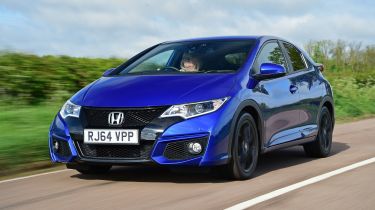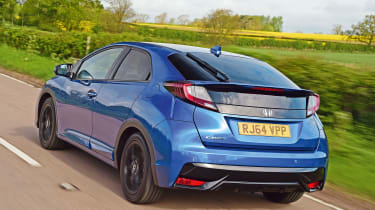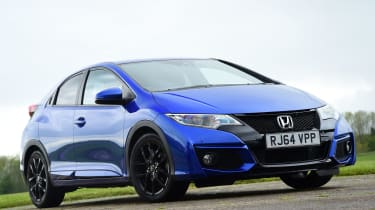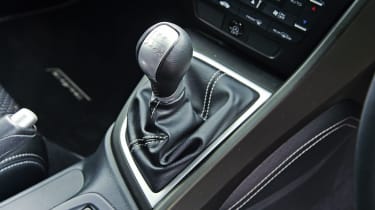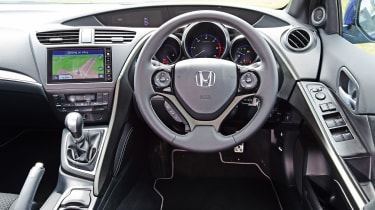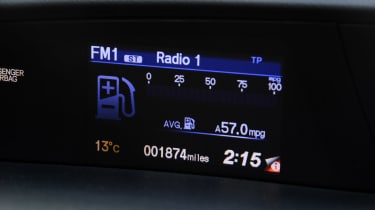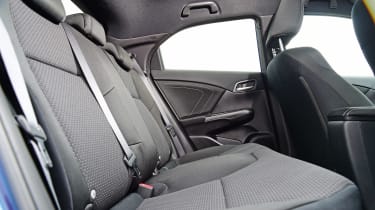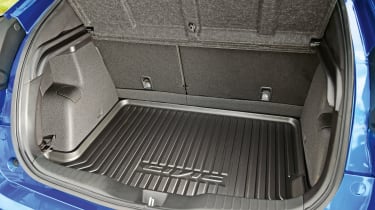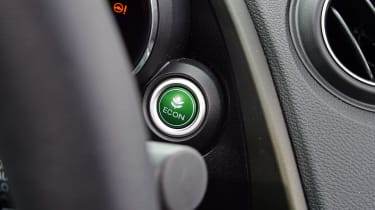Honda Civic hatchback review (2011 - 2017)
Marmite looks and a compromised package mean you've really got to want the latest Civic

The first Honda Civic dates all the way back to 1973 - a year before the all-conquering Volkswagen Golf. The Civic is now in its ninth generation, as has morphed from a dull-but-worthy Japanese hatchback to a real contender for the best that Europe has to offer. It combines massive space and practicality with a decent drive, good spec and a hard-earned reputation for endless reliability.
Though Honda sells Civic saloons and coupes in other world markets, the only models currently available in the UK are the five-door hatchback and the Tourer estate model. Both are available with a range of petrol and diesel engines and fight for supremacy in some of the most hotly contested markets in Europe.
In 2015, it was announced that Honda's Swindon plant would become the global production centre for all five-door Civic models from the next generation onwards. That car will go on sale in early 2017, with a range of new small capacity turbo engines and a similarly practical interior. Quality will be taken up a notch, while the new chassis and heavily revised suspension should make it more fun to drive.
Since going on sale in 2011, the current generation Honda Civic has undergone a series of tweaks and updates, with changes to the suspension and steering back in 2014. In 2015 it received a range of cosmetic alterations to bring it in line with the facelifted Ford Focus, new Peugeot 308 and ever-stylish SEAT Leon. New headlamps with LED daytime running lights, a reshaped bumper and revised rear spoiler are all included – as is a new Civic Sport trim.
The spec line-up now includes S, SE Plus, Sport and SR trim levels, and the range is topped by the flagship EX Plus.
Used - available now

2018 Honda
Civic
39,000 milesAutomaticPetrol1.5L
Cash £14,750
2021 Honda
Civic
54,000 milesManualPetrol1.5L
Cash £12,995
2018 Honda
Civic
56,000 milesManualPetrol1.5L
Cash £13,995
2018 Honda
Civic
2,645 milesAutomaticPetrol1.0L
Cash £14,995Compared to rival engine ranges from European manufacturers, the options available to Civic buyers are relatively limited. There are three engines to choose from, including a frugal 1.6 diesel offering 78.5mpg. Petrol buyers can opt for the entry-level 1.4-litre model, or the more powerful 1.8 i-VTEC – the latter engine being the only option if you want to drive an automatic. Hot hatch enthusiasts are also offered a 306bhp Civic Type R derivative.
The Honda Civic is a household name. First shown to the world in 1973, it's now in its ninth generation, with an all-new model due in UK showrooms during the first few months of 2017. The Ford Focus rival has enjoyed huge success over the years, thanks to its stand-out styling, bulletproof reliability and a uniquely practical interior. The current model continues this trend, but fails to address criticism about lacklustre engines and underwhelming handling.
However, in 2015, Honda revealed the extreme Civic Type R hot hatch to address these issues head-on. It's a riot to drive, acting as a halo product for the rest of the Honda range. It sits above a range of small petrol and diesel engines – including a punchy 1.6-litre i-DTEC capable of almost 80mpg.
• Honda Civic vs Skoda Octavia
If the marmite styling challenges some buyers, plenty of Honda fans remain hooked on the Civic’s unimpeachable reputation for reliability and near best-in-class residual values. There's a huge boot behind the rear seats, while a more practical Tourer estate version challenges the best in class for practicality.
Engines, performance and drive
A fidgety ride made the last generation Civic quite tiresome on some surfaces, but the latest version’s fluid-filled rear suspension bushes mean the ride is nice and smooth. It’s almost as comfortable on UK roads as the Volkswagen Golf. Thanks to its slippery aerodynamics the Civic doesn’t suffer from too much wind noise either, so it’s pretty quiet on the motorway, adding to the relaxing overall feel.
A 2014 update saw further improvements to the car’s front and rear dampers to make it better to drive and more comfortable on the move, but the changes are very small and most buyers may struggle to notice any difference. The new electric power steering system is smooth but it doesn’t have much feel at higher speeds, leaving the Civic a less engaging drive than the Ford Focus. All models come with a smooth-shifting six-speed manual as standard, but a five-speed automatic is also available as an option with the 1.8-litre i-VTEC unit only. Opting for the automatic box means you have to go without the fuel-saving stop-start system, unfortunately.
The new Honda Civic Type R brings a new level of performance compared to the old Civic hot hatch, with over 100bhp more thanks to the turbocharged 2.0-litre engine. It's extremely fast, highly entertaining and has an astonishing amount of grip.
Engines
On the engine front, the mainstream choices are a 98bhp 1.4-litre and 140bhp 1.8-litre i-VTEC petrols, or an 118bhp 1.6-litre i-DTEC diesel. The 1.6 i-DTEC diesel is the best option when it comes to blending performance and efficiency, as you get plenty of pulling power thanks to 300Nm of torque and Honda claims you’ll be able to return over 78mpg. Not too shabby, considering 0-62mph takes 10.5 seconds and in this guise the Civic tops out at 129mph.
This makes it only slightly slower than the 1.8-litre i-VTEC, which can see off 0-62mph in 9.1 seconds on course to 134mph. We’d advise against this engine though, as it needs to be revved quite hard to perform well and gets noisy. The 1.4-litre petrol is painfully slow, but should suit younger buyers looking for cheap insurance and rock-bottom running costs.
If the mainstream is insufficiently exciting, the Civic Type R is a racer for the road that boasts one of the hottest engines in the hatchback sector – unless you want to spend megabucks on a Mercedes A45 AMG or Audi RS3, that is. Otherwise the Type R beats all comers except the Ford Focus RS. Its 306bhp 2.0-litre turbocharged engine whisks you to 62mph in 5.7 seconds, and on to a whopping maximum of 167mph. Unlike previous hot Type Rs, the mid-range-boosting turbo means power delivery for the latest model is not all delivered at the top end - or ‘when the VTEC kicks in’, as aficionados used to say.
MPG, CO2 and Running Costs
There's no hybrid model of the ninth-generation Civic, and the diesel engine does the best job of keeping running costs as low as possible. The petrol engines are decent as well - the 1.4-litre i-VTEC petrol will return 52.3mpg and emits 129g/km of CO2, while the 1.8 i-VTEC gets 48.7mpg and 137g/km, or a slightly less impressive 44.8mpg and 148g/km when paired to the auto box. If you want to drive an auto Civic, the 1.8 petrol is the only engine option available – unfortunately you’ll lose the stop-start technology of the manual version too.
It’s the 1.6-litre diesel that is the most affordable Civic to run as it can return a near Golf BlueMotion-rivalling mpg figure of 78.5mpg, while emitting only 94g/km of CO2. It’s definitely the engine to go for if you look to keep an eye on running costs.
The 306bhp Type R, as you'd expect, pushes insurance and general running costs to new heights. But it still claims a decent 38.7mpg combined, with CO2 rated at 170g/km. At least if you refrain from driving it the way Mr Honda intended.
Insurance groups
The most recent Honda Civic is cheaper to insure than the previous model thanks to lower insurance groups, and the cost is now on a par – equivalent model for model – with the Volkswagen Golf.
That means an entry-level Civic with the 1.4 petrol engine falls into an economical group 5 – making it super cheap to run for younger buyers. The limited range Honda offers means the next best option is the 1.8-litre petrol at group 16. The 1.6-litre diesel bumps you up a couple more groups to 18, but there’s nothing to make you really wince unless you want to insure a Civic Type R in group 33. Even that’s the same group as the - less powerful - SEAT Leon Cupra 280, so owners shouldn’t grumble.
Depreciation
The Honda brand has enduring appeal to owners, and the reputation for reliability and affordable running costs all help to build strong residual values across the range.
Retaining around 45 percent of list price after three years may not sound like a brilliant sales pitch, but it’s in the same ballpark as the Volkswagen Golf. A Vauxhall Astra is likely to retain closer to 35 percent, although you’re more likely to score a bit of discount in the showroom.
Interior, design and technology
If you’re in the market for a compact hatch, it’s likely that the Civic’s design will have either drawn you in or put you off. It doesn’t look like any other car in the class, thanks to its bulbous body, short bonnet and rounded rear end. The ninth-generation model is an evolution of the Mk8 car that came before it, although for some, the toned-down lines aren’t quite as appealing as the out-there looks of its predecessor.
Up front, the previous Civic’s light bar makes way for a gloss black bumper and grille, while LED running lights were added as part of the 2015 update. These pick out the lower edge of the headlamp units and, unless you’re a Civic spotter, are about the only noticeable change to the exterior. The Sport that slots in between the SE Plus and SR models is by far the most stylish looking car in the range, with its gloss-black wheels, sleek side skirts and a body-coloured spoiler. But only the Type R could be described as truly exciting, with its huge rear wing, bulging wheelarches, active aerodynamic add-ons and large alloy wheels. It's certainly noticeable, but it won't appeal to all as it looks a little ‘aftermarket’ and over-the-top.
LED lights are standard and the distinctive split rear screen – similar to that found on now-defunct CR-Z – is carried over, but comes with a much-needed windscreen wiper this time around. Visibility is still severely compromised, but the reversing camera helps manoeuvring in tight car parks.
While arguably not as exciting to drive or look at as its main rivals (Type R model excepted), the Honda benefits from impressive equipment levels.
All models come equipped with climate control and USB connectivity. SE Plus adds accessories such as cruise control, that almost-essential parking camera, dual-zone climate control and automatic wipers and lights. Top-of- the-range EX Plus Civics get a panoramic sunroof and privacy glass (fitted on SR, too), plus keyless entry & go.
The Civic’s high-quality interior is better overall than the Ford Focus or Kia Cee’d, but doesn’t feel as upmarket as a Golf and suffers from an odd dashboard layout. Depending on your seating position the steering wheel blocks the speedometer and the various screens reflect in the windscreen at night, which can be distracting.
Sat-nav, stereo and infotainment
The Civic’s 2015 refresh included a new Android-operated touchscreen for top-spec models. It’s called MirrorLink, and brings the Civic’s infotainment system right up to date, as you can easily access various apps, contacts and music straight from your phone.
Bluetooth and sat-nav come as standard on SR and EX Plus models and can be added to the S, SE Plus and Sport specs as part of the Navi pack. You can also spend £450 on 3D digital sound processor for a concert hall effect from the audio system.
Practicality, comfort and boot space
There��s probably a reason no-one else makes a car that looks quite like the Honda Civic. You expect a reasonable amount of accommodation for the family in a five-door hatchback, but if your family members are leggy teens the Civic struggles to deliver.That’s not entirely bad news if your kids are smaller, because consequently the boot is massive.
But there are other downsides to that unique exterior design. While thin A-pillars make forward visibility good, chunky rear pillars mean reversing is awkward. Plus, although the split rear screen has been lowered, it still interferes with your view out of the back.
Size
The Honda Civic's dimensions are 4,300mm long, 2,065mm wide (with mirrors) and 1,470mm tall so it's quite a size. For the sake of comparison, a VW Golf 5-door is 4,255mm long and a SEAT Leon 4,263mm.
The Civic’s unusual shape does affect its interior packaging, but whether that’s a good or bad thing depends on your requirements as an owner. There’s huge boot space, but the rear passenger space is less impressive.In terms of kerbweight, the Civic ranges from 1,273kg to 1,416kg.
Leg room, head room & passenger space
That sloping rear roofline is a bit of a problem for rear seat passengers, as it encroaches significantly on headroom. It forced the Civic’s designers to push the rear seat forward, with an impact on rear legroom too – which of course is fine if your kids are still on the small side, or indeed if they fled the nest altogether years ago. It’s not an idle cliché to suggest most Civic owners are of the older and wiser variety.
The rear bench is a little narrow, making it difficult to carry three adults in comfort – although there are three seatbelts - but at least the front seat occupants are well accommodated. Honda has also dotted quite a few useful storage cubbies around the cabin. Isofix child seat mountings are standard on two seats in the back.
Boot
Now we’re talking… the Honda’s boot offers 477 litres of space (including 76 litres within an under-floor compartment), which is a massive 161 litres more than the Ford Focus and bigger than the 380-litre offering from the VW Golf.
The clever ‘Magic Seat’ rear bench means that you can fold the seats flat when you want to carry longer items, or flip the seats up cinema-style when you want to transport taller loads.
A low loading lip also makes it easy to load big items into the car, but in the quest to make every available litre of space available for luggage, Honda has decided to sacrifice a spare wheel in favour of a can of ‘get you off the motorway if you’ve had the right type of puncture’ tyre gunk.
Towing capacity varies across the range from 1,000kgs if you choose a petrol automatic, up to 1,400kgs for the diesel.
Reliability and Safety
Honda has a strong reputation for building reliable cars, and the Civic is unlikely to let you down. In our Driver Power 2016 satisfaction survey, it placed 40st out of 200 cars – a one place improvement over the previous year. That's not bad considering the current car is coming to the end of its life.
Owners rated the Honda’s practicality and running costs, and also praised reliability. Honda finished 20th overall, with performance and ride quality resulting in a slightly poor final rating.
The Civic earned a five-star Euro NCAP crash test rating in 2012, and there’s a lot of safety kit fitted as standard – including dual stage airbags side and curtain airbags, electronic stability control and seatbelt pre-tensioners.
However, if you want collision warning, blind spot monitoring, lane departure warning and traffic sign recognition, you have to fork out £600 for the Driver Assistance Safety Pack.
Warranty
The Civic comes with a three-year/90,000-mile warranty, which sounds impressive but that’s three times the mileage most owners will cover in 36 months. We’d be more impressed if Honda extended the period of cover free of charge, but instead it offers expensive extensions – a single year is £399, two years is £707 and three years extra cover costs £940.
However many rivals are stuck on three years and 60,000 miles, so if you want more cover as standard, look to Hyundai and Toyota who each offer five years, or Kia which offers seven.
Servicing
Honda’s fixed price servicing for the Civic costs £195 for the first year, £265 for the second and £245 for the third. So it’s not the cheapest around – a first service for the SEAT Leon costs £179 – and not the worst.
However Volkswagen manages to offer a three-year/30,000-mile servicing deal for £299 on all Golfs, and while a similar deal on Ford’s Focus costs £570, that’s still less than three years servicing at Honda’s fixed prices.
